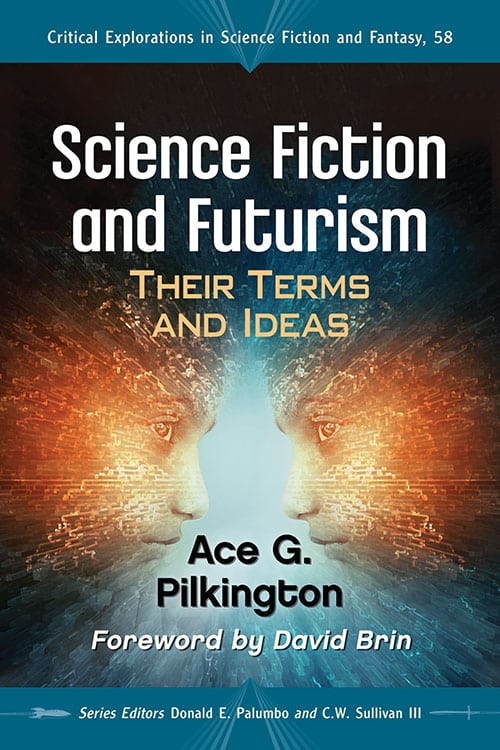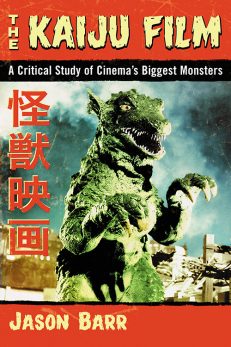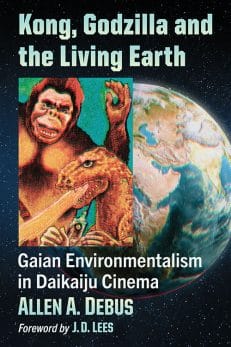Science Fiction and Futurism
Their Terms and Ideas
$35.00
In stock
About the Book
Science and science fiction have become inseparable—with common stories, interconnected thought experiments, and shared language. This reference book lays out that relationship and its all-but-magical terms and ideas. Those who think seriously about the future are changing the world, reshaping how we speak and how we think. This book fully covers the terms that collected, clarified and crystallized the futurists’ ideas, sometimes showing them off, sometimes slowing them down, and sometimes propelling them to fame and making them the common currency of our culture. The many entries in this encyclopedic work offer a guided tour of the vast territories occupied by science fiction and futurism. In his Foreword, David Brin says, “Provocative and enticing? Filled with ‘huh!’ moments and leads to great stories? That describes this volume.”
About the Author(s)
Bibliographic Details
Ace G. Pilkington
Series Editors Donald E. Palumbo and C.W. Sullivan III
Foreword by David Brin
Format: softcover (6 x 9)
Pages: 236
Bibliographic Info: bibliography, index
Copyright Date: 2017
pISBN: 978-0-7864-9856-7
eISBN: 978-1-4766-2955-1
Imprint: McFarland
Series: Critical Explorations in Science Fiction and Fantasy
Table of Contents
Acknowledgments xi
Foreword by David Brin 1
Key and Abbreviations 3
Preface 5
Introduction 11
Part One: The Terms of Science and Its Fictions
Alter Ego 21
Anachronism 24
Artificial Intelligence 27
Asimov’s Three Laws of Robotics 29
Atomics 34
Bad Code 41
BEM (Bug-Eyed Monster) 42
Big Dumb Objects 43
Bobble 45
Chronotransference 45
Clarke’s Laws 46
Corpsicle 47
Cosmogony of the Future 48
Cryonics 51
Cyberspace 55
Death Ray 58
Deep Blue 60
Doomsday Machine 66
Fermis 71
First Contact 74
Frankenstein Complex 77
Gas Giant 80
Goldilocks Planet 81
“He’s dead, Jim.” 81
Internet of Things 82
Ion Drive 83
Juno Spacecraft 86
Kludge 89
MacGyver 91
Metalaw 92
Multiplex Parenting 97
Mutant 99
Nanotechnology 105
Neural Lace 108
Pellegrino, Powell and
Asimov’s Three Laws of Alien Behavior 111
Positronic Brain 113
Railgun 114
Realtime 118
Robot 119
Robotics 123
SETI 123
Solar Sail 126
Solo Parenting 130
Stepford Wives 131
Teleportation 132
Time Bunny 136
Time Machine 137
Timequake 139
Timeskip 140
Timeslip 140
Uncanny Valley 142
Uplift 145
Uterine Replicator 149
Utility Fog 151
Wolfling 152
Part Two: Genre Terms
Alternate (or Alternative)
History 155
Archetype 156
Cassandras 157
Fantasy 160
Faust 161
Fictions of Nuclear Disaster 166
Fixup 170
Hard SF 170
Lost Colony 171
Lost World Story 172
Monomyth 173
Proto–Science Fiction 178
Rim World 178
Ruritania 179
Science Fantasy 180
Science Fiction 181
Scientific Romance 182
Sci-Fi 184
Separable Soul 185
Speculative Fiction 185
Speculative History 188
Speculative Nonfiction 189
Technothriller 190
Works Cited 193
Index 213
Book Reviews & Awards
- “Pilkington’s Science Fiction and Futurism is evidently a labor of love, and one that offers readers various avenues into the relationships among sf futurist thinking, and technological and scientific innovations…it firmly deserves a place in sf scholarship for its sheer verve, breadth of reference, and love of what sf does”—Science Fiction Studies
- “Pilkington’s book shines both by being readable and being comprehensive. It is a must-have for all scholars and students of the field.”—Matthew Wilhelm Kapell, author of Star Trek as Myth: Essays on Symbol and Archetype at the Final Frontier
- “Not simply an encyclopedia of terminology, but a primer for all degrees of specialty in science fiction, brimming with references that bring together two centuries of classic and popular literature, plus movies and television.”—Brian Taves, author of Hollywood Presents Jules Verne: The Father of Science Fiction on Screen.





